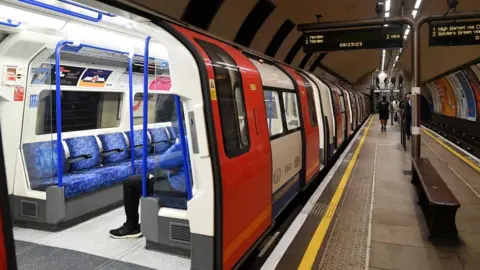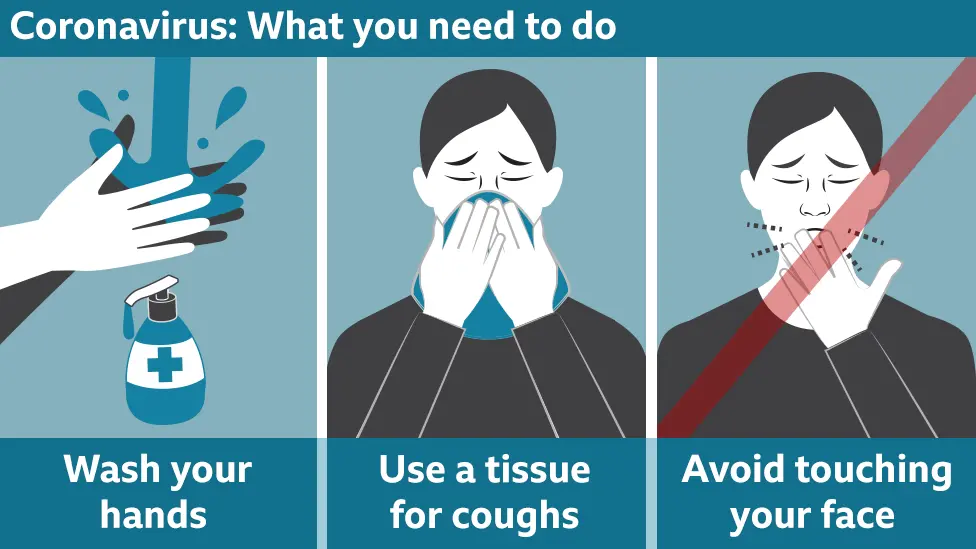Coronavirus: UK businesses feel impact of latest measures
 AFP
AFPBritons and UK businesses are feeling the impact of unprecedented coronavirus measures, as the chancellor prepares to unveil plans to help the economy.
Retailer Laura Ashley filed for administration as venues across the UK closed their doors, and airports warned they could shut down "within weeks".
It comes after the government outlined new advice to avoid unnecessary travel and contact with others.
And watchdog the OBR told MPs some businesses will 'inevitably' fail.
The head of the Office for Budget Responsibility, Robert Chote said Britain was facing something akin to a wartime situation for its public finances and a temporary spike in borrowing would be sensible.
On Monday, the Prime Minister said people should work from home where possible, and stay away from pubs and restaurants. People in at-risk groups will be asked within days to stay home for 12 weeks.
The number of people who have died with the virus in the UK has reached 55.
More than 1,500 people have tested positive for the virus in the UK - but the actual number of cases is estimated to be between 35,000 and 50,000.
The UK's shift in strategy comes as Europe plans to ban all non-essential travel throughout the Schengen free-travel zone, as more countries close their borders.

- LATEST: Follow live updates
- EASY STEPS: How to keep safe
- A SIMPLE GUIDE: What are the symptoms?
- TRAVEL PLANS: What are your rights?
- IN-DEPTH: Coronavirus pandemic

In Boris Johnson's first daily update on Monday he acknowledged the economy was facing "a severe blow" because of the virus.
The key new measures he announced included:
- Everyone should avoid gatherings with friends and family, as well as large gatherings and crowded places, such as pubs, clubs and theatres
- People should avoid non-essential travel and work from home if they can
- All "unnecessary" visits to friends and relatives in care homes should cease
- People should only use the NHS "where we really need to" - and can reduce the burden on workers by getting advice on the NHS website where possible
- By the weekend, those with the most serious health conditions must be "largely shielded from social contact for around 12 weeks"
- If one person in any household has a persistent cough or fever, everyone living there must stay at home for 14 days
- Those people should, if possible, avoid leaving the house "even to buy food or essentials" - but they may leave the house "for exercise and, in that case, at a safe distance from others"
- Schools will not be closed for the moment
Under the guidance, people who should be "particularly stringent" in minimising their social contact are:
- People over the age of 70
- Other adults who would normally be advised to have the flu vaccine (such as those with chronic diseases)
- Pregnant women

Why has the UK plan ramped up?

The UK's plan has shifted because the scientific modelling showed we were on course for a "catastrophic epidemic".
A strategy of just slowing the spread of the virus, but not trying to stop it, would have overwhelmed intensive care units.
The modelling by Imperial College London has been heavily informed by the experience in Italy and is influencing decisions at the heart of government.
Its calculations predicted 260,000 deaths in the UK.
Instead the plan is to drive down the number of cases to very low levels, which the models predict will limit deaths from coronavirus to the thousands or tens of thousands.
However, this approach comes with a major problem - there is no exit strategy.
Without the immunity that would build up if people were infected, then cases would soar as soon as measures are lifted.
The report said these could need to be in place until a vaccine is available, which could take up to 18 months.
We are in this for the long haul.

The expected economic announcement comes less than a week after new Chancellor Rishi Sunak published his Budget, which included £12bn specifically targeted at coronavirus measures to get the country through the outbreak.
Mr Sunak is also expected to appear at the now daily Downing Street news conference later.
BBC political editor Laura Kuenssberg said the £12bn announced in last week's Budget now looked potentially "completely inadequate" in the light of the way the crisis had developed.
However, she said she would be surprised to hear pledges similar to those on the drastic scale made by French President Macron, who promised hundreds of billions of euros on Monday.
Help for the airline industry, which has been crippled by travel bans and a collapse in demand, is expected to be among the new measures, according to BBC political correspondent Chris Mason.
Business closures
Pubs, theatres and music venues have expressed anger about the impact of the government's new guidance on their businesses.
Many have been critical that the prime minister advised people to stay away from social venues while not forcing premises to close, which could have given them financial protection.
Theatres and music venues around the UK, including the National Theatre, London Palladium and Royal Opera House, have announced they are to close from Monday night until further notice.
Other businesses affected:
- Fashion and home retailer Laura Ashley said it would appoint administrators and its shares would be suspended
- Carluccio's said the restaurant chain "was days away from large-scale closures"
- Cinema chains Odeon, Cineworld and Picturehouse will temporarily close their doors until further notice
- The Tate's museums will shut until 1 May
- The National Trust said it will close its houses, shops and cafes by Friday, but gardens and parks would remain open
Meanwhile, teachers' union NASUWT said a lack of advice for schools was causing a "rising sense of panic", adding that a "definitive decision" was needed on how to protect staff and pupils.
A World Health Organisation special envoy, Dr David Nabarro, welcomed the government's decision to shift strategy and advise greater social distancing to tackle the pandemic.
But he said further testing was needed to "understand much more precisely how the outbreak is advancing".
He told Radio 4's Today programme: "I would like to stress that in every other country positions are having to be shifted as we know more about the outbreak."
England's deputy chief medical officer Professor Jonathan Van-Tam said there were "significant moves afoot" to increase testing for the virus by the NHS.
But he added that "for now" it was going to be focused on where it would "help us most", such as patients in intensive care.
Meanwhile, some legislation will pass through the Commons unopposed this week as MPs feel the pressure to tackle the virus.
Emergency legislation on the outbreak, which will be introduced to Parliament on Thursday, and the government's Budget will get "nodded through", rather than opposition MPs calling for a vote.
The cabinet and shadow cabinet are also due to meet.
Labour leader Jeremy Corbyn met the prime minister on Monday evening and demanded support for the self-employed and those who cannot get statutory sick pay.
He described the government's communication strategy as "worse than inadequate", adding that they did not share the science and rationale behind their decisions with the public.
Mr Corbyn - who is 70 - said he would not follow advice to self-isolate and would carry on his duties as normal.

On Monday the total number of people in the UK to test positive for the virus rose by 171 in a day to a total of 1,543, according to the latest Department of Health figures. The latest cases include 30 more from Wales and 18 in Scotland.
Most of those who have died in the UK have been people over the age of 60 with underlying health conditions.
In Monday's briefing, Mr Johnson said the UK was approaching "the fast growth part of the upward curve" in the number of cases.
Sir Patrick Vallance, the UK's chief scientific adviser, said the UK is now "three weeks" behind Italy.
Italy, the worst-affected nation outside China - where the virus originated - has more than 25,000 cases and has suffered more than 2,000 deaths.

Do you work in the retail or service industry? How have you been affected by coronavirus? Share your experiences by emailing [email protected].
Please include a contact number if you are willing to speak to a BBC journalist. You can also contact us in the following ways:
- WhatsApp: +44 7756 165803
- Tweet: @BBC_HaveYourSay
- Send pictures/video to [email protected]
- Upload your pictures / video here
- Please read our terms & conditions and privacy policy
